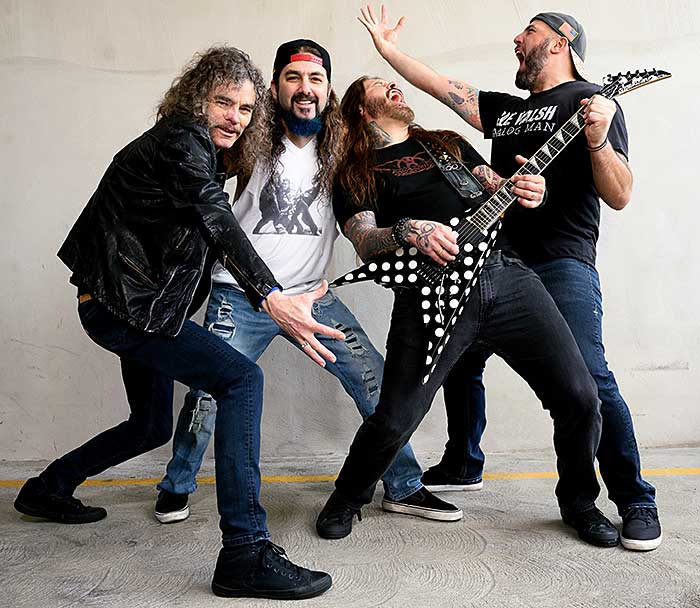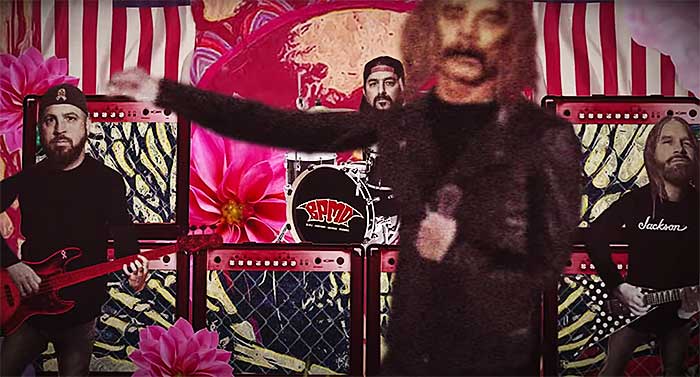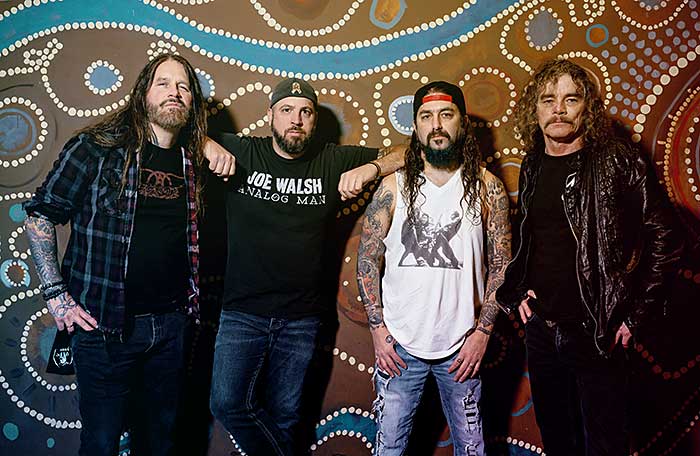
INTERVIEW WITH BOBBY “BLITZ” ELLSWORTH AND MARK MENGHI BY KELLEY SIMMS
From the first spin of BPMD’s American Made covers album via Napalm Records, it’s easy to tell that the group—featuring vocalist Bobby “Blitz” Ellsworth (Overkill), drummer Mike Portnoy (ex-Dream Theater, The Winery Dogs, Sons of Apollo), bassist Mark Menghi (Metal Allegiance), and guitarist Phil Demmel (Vio-lence, ex-Machine Head)—are having one hell of a time.
Consisting of 10 reimagined cover versions of classic hard rock tunes, including Ted Nugent’s “Wang Dang Sweet Poontang,” ZZ Top’s “Beer Drinkers & Hell Raisers,” Aerosmith’s “Toys in the Attic,” and Lynyrd Skynyrd’s “Saturday Night Special”—which was the song that sparked the whole project—American Made captures the spirit of 70s rock with heavy metalized renditions.
During a recent interview with Ellsworth and Menghi, the duo explained the initial idea for the project, the criteria for picking the songs as well as the band name, the recording process, and their future plans.
What was the initial intention for this project?
Menghi: I think we’re still trying to figure out the intention of this project! (laughs) There really wasn’t any, just more so about getting together and doing something fun. I mean, that was really the intention—just having some fun, jamming on some pretty cool music. That intention still hasn’t changed to this day.

With Mike and Phil already associated with Metal Allegiance, did that play a factor for this band?
Menghi: No, it was never in my thought process with this. Blitz and I were talking about doing something together, but we didn’t know what it was. Skynyrd came on, and I called him and said, “Hey man, what do you think about doing something like this?” And then he started rattling off the tunes he’d like to do and then who are we going to get to play drums and guitar? I was like, “I’m sure we could get Mike, I’m sure we could get Phil, that would be awesome.” There was really no thought process. It was just, let me call Mike and Phil and see what happens. Metal Allegiance never came into play on this.
“THAT WAS REALLY THE INTENTION—JUST HAVING SOME FUN, JAMMING ON SOME PRETTY COOL MUSIC.”
The rules for selecting the songs to perform on the album were that each member got two picks, then two wild card picks that each of you voted on. How did you come up with the wild card songs “We’re An American Band” and “Walk Away?”
Ellsworth: Yeah, I mean there were still some rules to this. I’ll be honest with you, they were a little bit flexible, but I think it was half of the fun. Mark mentioned the fact that it was going to be fun. It was going to be four guys to play this stuff. “We’re An American Band” [by Grand Funk Railroad] was a no brainer if the criteria was the 70s and hard rocking American bands. That’s really kind of the badge on this whole project because actually it’s almost the title of the record. That was just thrown out there, and I think it was Mike Portnoy who said, “How about some James Gang ‘Walk Away?’” I thought that was interesting and I haven’t visited that in many years. So, it was just really casual and fun. I’m not trying to fuck up a good idea. You can overthink stuff to the point where you can ruin it. In my opinion, this was just spontaneous fun.

Did you purposely think outside of the box and pick tunes that your normal fans might not associate you with?
Menghi: Oh, absolutely. I think the perfect example is, they might associate us with Van Halen. I think most of the thrash world loves Van Halen, but Cactus with “Evil,” which is an old Willie Dixon song, I think that might’ve been a curveball. “Tattoo Vampire” from Blue Oyster Cult is probably the deepest track on this record, which is a complete curveball. Even for Blitz and I, it was a curveball. So, I think definitely half the record would have been a curveball scenario.
“‘TATTOO VAMPIRE’ FROM BLUE OYSTER CULT IS PROBABLY THE DEEPEST TRACK ON THIS RECORD, WHICH IS A COMPLETE CURVEBALL.”
Were there any tracks that were leftovers or ruled out, but could have been strong contenders?
Ellsworth: Nothing was ruled out. That was part of the idea. Like, if I picked two, you had to do those two, there was no talking about it. That was the cool rule of this whole project. So, for me, the hardest ones were “DOA” and “Tattoo (Vampire),” and they were both Demmel picks, and I was like, “Wow, this is stuff that I never would have guessed.” I knew Aerosmith might show up. I knew Ted might show up. I knew Skynyrd was showing up, but I had never expected Van Halen or Blue Oyster Cult. But it worked out because that became the challenge. We had to put a little bit of work into it, a little bit of thought, and a little bit of adapting your own presentation to the collective bands and collective songs.
The album was recorded at Portnoy’s home studio in one day. How did that process go?
Menghi: We did the drum tracks in one day as we were arranging the songs and getting everyone’s ideas and visions together. He has the capability to do that at his studio. So, Phil and I would be playing live and we just kept that record button going. So, that energy you feel off the record is a direct result of my playing to us and Bobby singing in one area. If you look at the “Evil” drum play through the video that we just posted, you see Demmel in the glass cabin, you see my head bopping up and down on the couch over there playing, and you’re hearing him recording us. That was the beauty of this. And then from there, we took that and Phil, myself, and Bobby recorded that part separately. I went to my studio here at home, Bobby went to his studio and engineer that tracks him with Overkill, and Phil went to his engineer in the Bay Area. But we all kept the mindset of “Lets do this in one take,” especially me as the bass player. I went in as, “If I screw this up, I’m not going to cut, copy, or paste this stuff. I’m starting the whole song over again.” Because that’s going to keep that live feeling intact and it’s also going to have that groove and a swing. You’re not going to get that by copying and pasting and punching. At that point, it’s not natural. So, that was really the goal with the recording process.
Ellsworth: We wanted some authenticity with it. We had to, of course, reimagine the songs and present them with our approach to them, but we wanted to keep them legitimate. And the way to do that was the way Mark just described as far as the recording goes.
“WE ALL KEPT THE MINDSET OF ‘LETS DO THIS IN ONE TAKE’”
Mark, you’re a huge vinyl collector. How many do you think you have and what’s your most cherished album?
Menghi: I never counted how many I had. I honestly don’t know. I probably have close to between 800 and 1,000 vinyls. I actually lost a lot of those vinyls about six, seven years ago. I lost a good amount of them, which I haven’t replaced over the years. But now I’ve got a healthy number—a lot of original first pressings, which are hard to get. To get those first pressings when they came out, that’s a tough task to do. Probably my most cherished vinyl is my first pressing of Metallica Kill ‘Em All on Megaforce, which is signed by Cliff, James, Lars, and Kirk. That doesn’t get touched!
You’ve probably been asked this a lot, but how did you choose the order of the members’ initials for the band name?
Ellsworth: The smartest! (laughs)
Menghi: Last week Blitz said it was the oldest! (laughs)
Ellsworth: I grew up in the era of Crosby Stills & Nash, Emerson Lake & Palmer, and Beck, Bogart & Appice. The importance of the BMPD moniker was to also mix a bit of that era. Just to be simplistic—four guys getting together and lets just make this happen with this kind of a mindset. I’m 61, so the point is, I grew up in this era. This is when I was cutting my teeth on rock ‘n’ roll back in the 1970s. Whether it be my first car or my first bicycle, or to be at a buddy’s house after school. Whether it be smoking a joint, drinking a beer. Whatever kids did back then. So, the point is, for me, I come from that era. There was no transformation, this is this transportation back in time. I think that when the name BPMD came up, just throwing it around the room, I was like, perfect, authentic. That’s what this was all supposed to be about.

Will BPMD just be a project, or do you think it will be a full-fledged band with original material and eventually touring?
Menghi: It’s definitely never going to be a full-fledged touring band. We all have our other things outside of BPMD, and once the world gets back into somewhat of an orderly fashion, Overkill’s going to go on tour and they have records to do. It would suck if they had to stop, you don’t want that. Demmel has Vio-lence reformed. There’s a lot going on, so we could never be a touring band. But to do festivals or select shows and specialty shows? Absolutely. That was the initial plan. That was one of the beauties of this project. We want to get out there, we want to play. We also have ideas to do other records past this. There’s so much music that came out in the 70s that we all equally love. There’s a lot of ideas floating around. It’s just a matter of seeing what comes to fruition.
“THE MUSICIANSHIP IS SERIOUS, BUT THE IDEA IS SUPPOSED TO PUT A SMILE ON YOUR FACE”
Ellsworth: If the whole motivation of this was to have fun, I think we accomplished it. You press play, it’s a fun record. The musicianship is serious, but the idea is supposed to put a smile on your face and how great would that be live. And my feeling is the timing of this record and the record coming out at this time, it’s probably one of the most funnest times in my personal life, just with everything else that’s going on. Maybe you’re still having fun, but I’m saying it’s for sure the new normal is something very different. But I think somewhere in this it proves that fun still exists. And that’s what the four of us tried to do.
What’s next for each member of BPMD?
Menghi: I’m taking a sabbatical! No, we’ll see once the world gets back to normal. Where I am in New York, today is phase one of opening back up out of four phases. So, we’ll see how things go. There’s a lot of moving pieces and elements within Metal Allegiance. To have travel restrictions and to not be able to write or do the rehearsals, I refuse to do it over it internet. I won’t do an internet record. Alex [Skolnick, Metal Allegiance guitarist] and I have traded demos back and forth and this and that, but it’s never going to go past just trading demos. In order for it to move forward, we need to be able to get into a room together.
“WE’RE ALL IN THIS TOGETHER AND YOU GOT TO GRAB AND LATCH ONTO THE THINGS THAT KEEP IT RIGHT FOR YOU.”
Ellsworth: I’m going to need as much time as I can here to use this memorable event in our lifetime to reinvent myself. To try to, as I always do, contribute the best parts I’ve ever come up with for the next Overkill record. So, I want that normality that it still seems business as usual. I know the world here is almost spinning backwards right now, or it seems that way to many people. But hey, we’re all in this together and you got to grab and latch onto the things that keep it right for you. I got my motorcycle, I’m looking at my studio right now so to speak. Mr. Menghi’s teaching me how to cook via text and pictures. Looking at this time, reacting to this event in all of our lives as if it is coming out of it with positive results. So, I look forward to a great Overkill record and more fun with the BPMD guys.




















